Friday, July 22. 2011
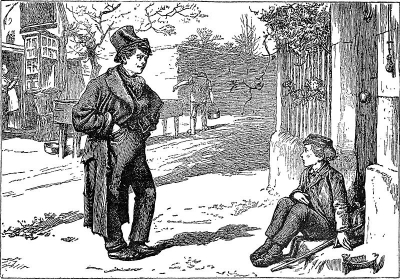 Assuming the world has not gone entirely bonkers (and the US Attorney's Office has not contracted terminal wikileakimania), the charges against Aaron Swartz will be dropped...
[UPDATE (2013): Alas, they were not, with tragic results: Adam Swartz 1986-2013]
...as they have been by JSTOR once it becomes clear that he was (as I hope!) only data-mining what he downloaded, not redistributing it.
Breaking into a locked room and computer at MIT is not ethical except if something far more important and justifiable is at stake -- but Swartz will be pardoned for that peccadillo too.
Yet access to retroactively scanned journal article databases is definitely not the same sort of "primal right" as access to current, born-digital articles, where the access is willingly provided by their authors, at no cost to themselves or the user.
In other words, author give-away is not the same thing as user rip-off.
Back-scanning and archiving services may well be over-charging, substantially, relative to their expenses, and that should be challenged and remedied, but the remedy is not theft.
I hope the JSTOR downloading caper will not be conflated or even associated with the legitimate worldwide efforts by researchers to give and get open access to one another's own refereed research.
Stevan Harnad
EnablingOpenScholarship
Friday, July 1. 2011
  Richard Poynder: Richard Poynder:
"Peter Suber: Leader of a Leaderless Revolution"
Open and Shut [& Information Today]
1 July 2011.
Congratulations to Richard Poynder for another timely, incisive and insightful OA interview.
And heartfelt admiration and gratitude to the undisputed leader of the leaderless OA revolution, Peter Suber!
…Which doesn't prevent me from mentioning two minor strategic matters!
(1) It is a good idea to recommend, as Peter does, that non-Green publishers channel any opposition or apprehension they may have concerning OA or Green OA self-archiving mandates into embargoing Green OA self-archiving instead of lobbying against Green OA self-archiving mandates.
But I don't think it's a good idea to encourage Green OA publishers like Springer (or Elsevier, or APS or any of the other 60% of publishers who are already Green on immediate, unembargoed Green OA self-archiving) to backslide into embargoes rather than lobby against Green OA self-archiving mandates!
Let those publishers who wish to lobby against Green OA self-archiving mandates do so, if they wish. The benefits -- to research, researchers, their institutions, their funders, the R&D industry, students, and the tax-paying public -- are so overwhelming that lobbying against Green OA mandates is extremely unlikely to be successful, especially regarding institutional mandates. For whereas not all research is funded, virtually all of it, funded and unfunded, originates from universities and research institutions. Anti-mandate lobbying has had some success in delaying the adoption of Green OA self-archiving mandates at the government funder level, but it has no leverage at the institutional level.
(2) The broad-spectrum, low-selectivity, pass/fail mega-journal certainly has a potential niche today (whether OA or non-OA), but not only is that not the only way, the best way, or the most economical way for researchers to provide OA for their articles (Green OA self-archiving is), but it does not provide the level of quality control that the users of the top journals in each field need and depend on: Deferring that for "postpublication" peer review is not only the equivalent of embargoing it (and with a much less certain outcome), but it deprives authors of the level of immediate scrutiny and feedback that they expect and need from today's top journals, while also depriving users of the immediate indicators of a paper's quality level.
The immediate purpose of OA is to free the entire hierarchy of peer reviewed journals, such as they are, from access-barriers for all potential users: the purpose is not to flatten the peer review quality hierarchy and wait for pot-luck thereafter!
Stevan Harnad
EnablingOpenScholarship
Sunday, June 19. 2011
 Richard Poynder Interview Richard Poynder Interview
Open Access by Numbers
Open and Shut, 19 June 2011 "Few can now doubt that open access (OA) to scholarly research is set to become an important feature of the scholarly communication landscape. What is less certain is how much of the world’s research literature is currently available on an OA basis, how fast OA is growing, and what percentage of the world’s academic and scientific literature will be OA in the long-term."
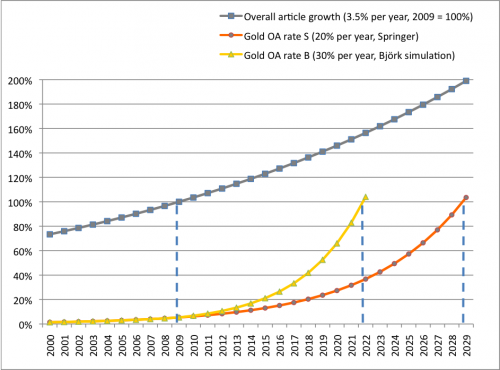
Figure 1. Springer Gold OA growth curve S (20% per year) and simulated Björk growth curve B (30% per year) (Laakso et al 2011) equated for year 2009. Note that the Björk curve would reach 100% Gold OA for all journals (ISI + non-ISI) in 2022, at a time when the Springer curve would not yet have reached 40% for ISI journals. Laakso et al's estimate of 30% Gold OA growth and Springer's estimate of 20% Gold OA growth can be reconciled if we note that the 30% rate was as of 2000, and has slowed to 20% as of 2005. More important, either way, the Björk curve would not reach 60% till 2019, and the Springer curve would not reach 60% till 2025, whereas the four mandated repositories had already reached 60% in 2004-2006, within two years of having adopted their mandates (Figure 2, below).
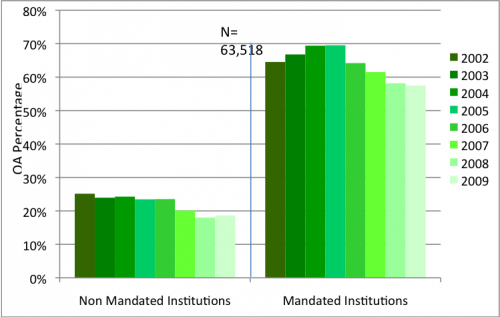
Figure 2. Percent green OA self-archiving averaged for the four institutions with the oldest self-archiving mandates, compared to the percentage for control articles from other institutions published in the same journals (for years 2002-2009, measured in 2011). Respective totals are derived from Thompson-Reuters-ISI index. Mandates triple the percent Green OA (Figure 3, below).
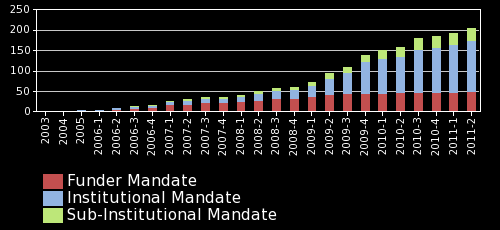
Figure 3. Yearly increase in the number of Green OA self-archiving mandates adopted by institutions and funders (data from ROARMAP).
Stevan Harnad
EnablingOpenScholarship
Thursday, November 4. 2010
 Despite its protests that " more than 20 hours of video [are] uploaded every minute worldwide," google and youtube are definitely guilty already of gross neglect and irresponsibility. Instead of sloughing off responsibility by offloading it onto "community vigilance," google should use its enormous multilingual mechanical and computational resources to flag automatically all posted youtube content that contains a growing list of code words (known names and terms, in all languages) and immediately divert all suspect postings to a human inspection buffer before allowing them to be publicly viewable.
Everyone is making monumental worldwide efforts in screening at airports, and now in cargo transport, with real human time and energy and money involved, yet one enormous company, with the means to do automated computational screening of unprecedented power and pinpoint specificity -- look how much ingenuity is put into screening shoppers' predilections -- is not exercising its latent capacity on content with equally unprecedented damage potential vastly exceeding any airport's. Instead, google/youtube is waiting passively for the damage that it hosts and amplifies to be dutifully detected by the worldwide user community (good supplement to -- but no substitute for -- automatic screening).
As newspapers have lately reported, a simple search on a prominent terrorist's name retrieves over 5000 videos. The postings from accredited news organizations could be hand-cleared easily. But there are plenty up there from the sage himself, advocating jihads and fatwas and god (sic) knows what else, with thousands of user views and no user alert flags (or none that have been acted upon).
Text can of course be almost as menacing as videos, but the penetration and band-width of videos in today's media-shaped brain-space is much greater, so computational pre-emption there should have an even higher priority.
And before the reflexive, unreflective laissez-faire fatalists begin to whine about censorship and freedom of expression, recall that this is not about the right to speak or publish but about the privilege of using one private company's global megaphone.
Entrust porno-flagging to the global usership, but not terror-flagging. Otherwise we are playing global gaussian roulette.
Monday, May 18. 2009
From Peter Suber's Open Access News:
 Wendy Hall has been elected a Fellow of the Royal Society for her work in computer science, which includes important work on OA. See the announcement from the University of Southampton or the announcement from the Royal Society, both from May 15, 2009. (Thanks to Stevan Harnad). Wendy Hall has been elected a Fellow of the Royal Society for her work in computer science, which includes important work on OA. See the announcement from the University of Southampton or the announcement from the Royal Society, both from May 15, 2009. (Thanks to Stevan Harnad).
At the time Hall was appointed a Dame Commander of the British Empire (DBE), Stevan Harnad, her colleague in the University of Southampton School of Electronics and Computer Science, summarized her contributions to OA: An invaluable friend to Open Access, University of Southampton's Professor Wendy Hall, as Head of the School of Electronics and Computer Science from 2002 to 2007, not only presided over the adoption and implementation of the world's first Green OA Self-Archiving Mandate, but she quietly went on to help get Green (ID/OA) Mandates adopted at the European level, as a founding member of the Scientific Council of the European Research Councilas well as President of the British Computer Society (BCS) and member of the Prime Minister’s Council for Science and Technology. It is no small thanks to Wendy's support that the UK in particular and Europe in general are leading the world in its inexorable progress toward the optimal and inevitable outcome for scientific and scholarly research, at long last. And this is but one part of what Wendy has done for computer science, and science in general.... Also see our past posts on Hall and her OA work.
Sunday, May 3. 2009
The open access tracking project (OATP) has been launched to encourage a collaborative approach to generate a record of new open access developments, Peter Suber notes in the May issue of SPARC Open Access Newsletter: The idea is to tag new OA developments and recruit others to do the same. On the many-eyeballs principle, we'll notice many more new developments together than any of us could notice on our own. A group feed will broadcast the results of what we notice to everyone who wants to follow along. The project offers three types of feed for people to follow the new developments.
Saturday, May 2. 2009
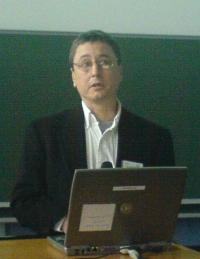 Peter Suber, the de facto leader of the Open Access movement has been appointed a Fellow of the Berkman Center for Internet & Society at Harvard University. Peter Suber, the de facto leader of the Open Access movement has been appointed a Fellow of the Berkman Center for Internet & Society at Harvard University.
A brilliant choice, and eminently well-deserved. Peter -- whose historic contributions to the growth of OA have been spectacularly successful -- will continue his invaluable OA work, but this Fellowship will also make it possible for him to begin writing the books on OA and related matters that are welling up in him, and that the world scholarly and scientific research community (as well as the historians of knowledge) are eagerly waiting to read, digest and learn from for years to come.
It is so gratifying to see true merit being rewarded occasionally, as it ought to be (although my guess is that this is just the beginning of the honors to be accorded to this selfless and sapient transformer of Gutenberg scholarship into PostGutenberg scholarship).
With much gratitude and admiration,
Stevan Harnad
Wednesday, March 11. 2009
 I don't know how he does it. His article, " Open Access: Whom would you back?", is full of points with which I profoundly disagree. But he has written it so fairly and so insightfully and so stimulatingly that all one can do is admire it, and him, yet again.
I may be writing a critical commentary shortly, but in the meantime, all I can do is highly recommend it to everyone with any interest in the exciting current developments in Open Access (OA). It will bring you up to speed with the OA movement and also give you a shrewd and penetrating peek at OA's possible future.
Agree or disagree, you cannot fail to be informed, and impressed. The OA movement is fortunate indeed to have Richard Poynder as its chronicler, conscience, and gadfly laureate.
Stevan Harnad
American Scientist Open Access Forum
Saturday, March 7. 2009
Reply to: Conyers, John (2009) A Reply to Larry Lessig. The Huffington Post. March 6, 2009.
 Congressman John Conyers (D. Mich) is probably sincere when he says that his motivation for his Bill is not to reward contributions from the publishers' anti-OA lobby: He pretty much says up front that his motivation is jurisdictional.
Here are the ( familiar, and oft-rebutted) arguments Rep Conyers refloats, but I think he is raising them less out of conviction that they are right than as a counterweight against the jurisdictional outcome he contests because it is his committee that he feels ought to have decided the outcome of the NIH Public Access Bill. (By the way, the original Bill was anything but secret as it made its way through the House Appropriations Committee, then the House, then the Senate, as Peter Suber's many OA News postings archived along the way will attest.) Rep. John Conyers:
"[O]pponents [of mandating Open Access to publicly funded research] argue that, in reality, it reverses a long-standing and highly successful copyright policy for federally-funded work and sets a precedent that will have significant negative consequences for scientific research." (1) Not a Copyright Policy: There is a longstanding federal policy of not allowing federal employees to transfer copyright for research that they do as part of their paid job. It would be quite natural, and no "reversal" at all, to extend this to federal fundees as well.
(2) A Self-Archiving Precondition: But in fact the NIH Public Access Policy does not even do that! It doesn't extend or reverse anything with respect to copyright. It simply requires NIH fundees to make their published articles OA as a (prior) condition of receiving NIH funding, by self-archiving their final drafts free for all online.
(3) Evidence of Positive Consequences: The actual consequences of self-archiving to date have all been positive ones, for research progress: enhanced visibility, access, uptake, usage, applications and impact for research findings.
(4) No Evidence of Negative Consequences: The "significant negative consequences" to which Mr. Conyers alludes (on the prompting of the publishing lobby) are the hypothetical possibility -- for which there so far exists no actual evidence whatsoever -- that OA self-archiving will cause subscriptions (largely institutional) to be cancelled catastrophically, making them unsustainable as the means of covering the costs of peer review.
(5) Subscription Collapse Would Itself Free the Institutional Windfall Savings to Pay for Peer Review: But the answer to that hypothetical conjecture is that if and when institutional subscriptions were ever to collapse unsustainably, the costs of peer review would be paid for out of the same institutions' self-same subscription cancellation savings -- per outgoing published article instead of per incoming subscribed journal (and with a lot of money saved all round, for products and services that would no longer need to be provided or paid for if the market for subscription was no longer there, such as the print-on-paper edition and its distribution, as well as the online edition): The premise of subscription collapse, after all, is that users will prove so satisfied with the final peer-reviewed drafts self-archived worldwide by their authors under global self-archiving mandates, that there will no longer be any market for subscriptions to the publisher's print or PDF version; hence only the peer review itself would be left to pay for out of all the windfall cancellation savings.
( 6) Peer Review Alone Costs Far Less: Nor are those peer-review costs high, since not only do researchers give their papers to publishers for free to sell, but researchers also perform the peer reviewing for publishers for free! So all that's left in the online age is a competent specialist (editor) to choose the peer-reviewers and to adjudicate the referee reports and revisions to ensure they meet the journal's quality standards, plus software to track referee reports, send reminders, and manage the correspondence with the referees. Once it is found acceptable for publication, the author's final draft is simply certified as having been published by that journal. Rep. John Conyers:
"These opponents argue that scientific journals expend their own, non-federal resources to manage the peer review process, where experts review academic publications. This process is critical because it provides the quality check against incorrect, reckless, and fraudulent science and furthers the overall quality and vigor of modern scientific debate. Journal publishers organize and pay for peer review with the proceeds they receive from the sale of subscriptions to their journals, thereby adding considerable value to the original manuscripts of research scientists." All true. But no argument at all against Open Access self-archiving mandates! As long as subscriptions remain sustainable to cover the peer review costs, along with all the other products and services that are currently bundled in with it (producing and distributing the print-on-paper edition as well as the online PDF edition), things continue exactly as they do now (and as they have done for over a decade in the few fields, such as high energy physics, where OA self-archiving has been going on spontaneously at close to 100% levels already with no detectable effect on subscriptions).
And if ever subscriptions fail, peer review will be paid on the OA publication-fee model that some OA journals such as PLoS and BMC already use today -- but paid for out of the universal windfall cancellation savings, instead of out of extra funds, poached from somewhere else (often scarce research funds themselves!), as now.
In other words, the ominous talk about a threat to peer review is patent nonsense. Rep. John Conyers:
"The policy Professor Lessig supports, they argue, would limit publishers' ability to charge for subscriptions since the same articles will soon be publicly available for free. If journals begin closing their doors or curtailing peer review, or foist peer review costs on academic authors (who are already pay from their limited budgets printing costs in some cases), the ultimate harm will be to open inquiry and scientific progress may be severe. And the journals most likely to be affected may be non-profit, scientific society based journals." The reason this is patent nonsense is that it invokes catastrophic subscription cancellations as the threat, but completely ignores the fact that the ones who are saving money on the incoming journal subscription cancellations are the researchers' institutions -- the very same ones who would then have the money to pay for the (far lower) costs of peer review alone for their own researchers' outgoing articles' peer-review costs, after the hypothetical collapse of subscriptions.
Regardless of whether journals are for-profit or nonprofit, it is clear that research is not an activity that is being funded and conducted in order to provide revenue for those journal publishers! The journals are produced to provide a service to research, researchers, and especially the public who funds the research and for whose benefit the research is being conducted -- a service currently being paid for in full by institutional subscriptions. If and when the only publisher service there is a market left for is peer-review alone, and not the other products and services it is co-bundled with today (and has been ever since Gutenberg), then the peer review will simply be paid for up front, and there will be plenty of saved money out of which to pay for it.
 To try instead to keep holding back OA, now that the online medium has made it not only possible, but optimal and inevitable -- and to hold OA back despite its demonstrated direct benefits to research, just in order to indemnify publishers' current subscription revenues and modus operandi against hypothetical risk is rather like trying to keep coal-fed steam engines or horse-drawn carriages in service in order to insure the revenues of stokers and the hay industry -- except it's more like trying to do that with hospital ambulances. ( And that's no less true when it is "Learned Society Publishers' 'Good Works'" that are being invoked as the justification for holding up the ambulance than when it's just commercial publishers' purported greed.)
Reference
Berners-Lee, T., De Roure, D., Harnad, S. and Shadbolt, N. (2005) Journal publishing and author self-archiving: Peaceful Co-Existence and Fruitful Collaboration.
Stevan Harnad
American Scientist Open Access Forum
Sunday, February 15. 2009
 Corbyn, Zoë (2009) "Conflict of interest warning over Evidence sale" [to Thompson Reuters]. Times Higher Education Supplement. 22 January 2009 There is indeed not only a potential but an actual conflict of interest when the party that is comparing and assessing the different candidate data and databases that can be used in UK national research assessment is the commercial producer of one of the candidate databases.
HEFCE is sleep-walking in letting this happen, and in several other decisions it is making without thinking them through properly, including the failure to test and validate a rich variety of other potential research-assessment metrics, over and above the few that either Thompson-Reuters ISI or its (now disadvantaged) rival SCOPUS can offer, especially the ones provided by the growing worldwide network of Open Access Repositories.
HEFCE is well on the way to foolishly locking itself into dependence on only what is available from a single commercial provider -- under the guise of an objective assessment by an independent honest broker.
Stevan Harnad
American Scientist Open Access Forum
Harnad, S. (2001) Research access, impact and assessment. Times Higher Education Supplement 1487: p. 16.
Brody, T., Kampa, S., Harnad, S., Carr, L. and Hitchcock, S. (2003) Digitometric Services for Open Archives Environments. In Proceedings of European Conference on Digital Libraries, Trondheim, Norway.
Harnad, S., Carr, L., Brody, T. & Oppenheim, C. (2003) Mandated online RAE CVs Linked to University Eprint Archives: Improving the UK Research Assessment Exercise whilst making it cheaper and easier. Ariadne 35.
Harnad, S. (2006) Online, Continuous, Metrics-Based Research Assessment. Technical Report, ECS, University of Southampton.
Carr, L., Hitchcock, S., Oppenheim, C., McDonald, J. W., Champion, T. and Harnad, S. (2006) Extending journal-based research impact assessment to book-based disciplines. Technical Report, ECS, University of Southampton.
Harnad, S. (2007) Open Access Scientometrics and the UK Research Assessment Exercise. In Proceedings of 11th Annual Meeting of the International Society for Scientometrics and Informetrics 11(1), pp. 27-33, Madrid, Spain. Torres-Salinas, D. and Moed, H. F., Eds.
Brody, T., Carr, L., Harnad, S. and Swan, A. (2007) Time to Convert to Metrics. Research Fortnight 17-18.
Brody, T., Carr, L., Gingras, Y., Hajjem, C., Harnad, S. and Swan, A. (2007) Incentivizing the Open Access Research Web: Publication-Archiving, Data-Archiving and Scientometrics. CTWatch Quarterly 3(3).
Harnad, S. (2008) Self-Archiving, Metrics and Mandates. Science Editor 31(2) 57-59
Harnad, S. (2008) Validating Research Performance Metrics Against Peer Rankings. Ethics in Science and Environmental Politics 8 (11) doi:10.3354/esep00088 (Special issue: The Use And Misuse Of Bibliometric Indices In Evaluating Scholarly Performance)
Harnad, S., Carr, L. and Gingras, Y. (2008) Maximizing Research Progress Through Open Access Mandates and Metrics. Liinc em Revista 4(2).
Harnad, S. (2009) Multiple metrics required to measure research performance. Nature (Correspondence) 457 (785) (12 February 2009)
|
 Assuming the world has not gone entirely bonkers (and the US Attorney's Office has not contracted terminal wikileakimania), the
Assuming the world has not gone entirely bonkers (and the US Attorney's Office has not contracted terminal wikileakimania), the 




 Despite its protests that "
Despite its protests that "
 Peter Suber, the
Peter Suber, the 
 Congressman John Conyers (D. Mich) is probably sincere when he says that his motivation for
Congressman John Conyers (D. Mich) is probably sincere when he says that his motivation for  To try instead to keep holding back OA, now that the online medium has made it not only possible, but optimal and inevitable -- and to hold OA back despite its demonstrated direct benefits to research, just in order to indemnify publishers' current subscription revenues and modus operandi against hypothetical risk is rather like trying to keep coal-fed steam engines or horse-drawn carriages in service in order to insure the revenues of stokers and the hay industry -- except it's more like trying to do that with hospital ambulances. (And that's no less true when it is
To try instead to keep holding back OA, now that the online medium has made it not only possible, but optimal and inevitable -- and to hold OA back despite its demonstrated direct benefits to research, just in order to indemnify publishers' current subscription revenues and modus operandi against hypothetical risk is rather like trying to keep coal-fed steam engines or horse-drawn carriages in service in order to insure the revenues of stokers and the hay industry -- except it's more like trying to do that with hospital ambulances. (And that's no less true when it is


